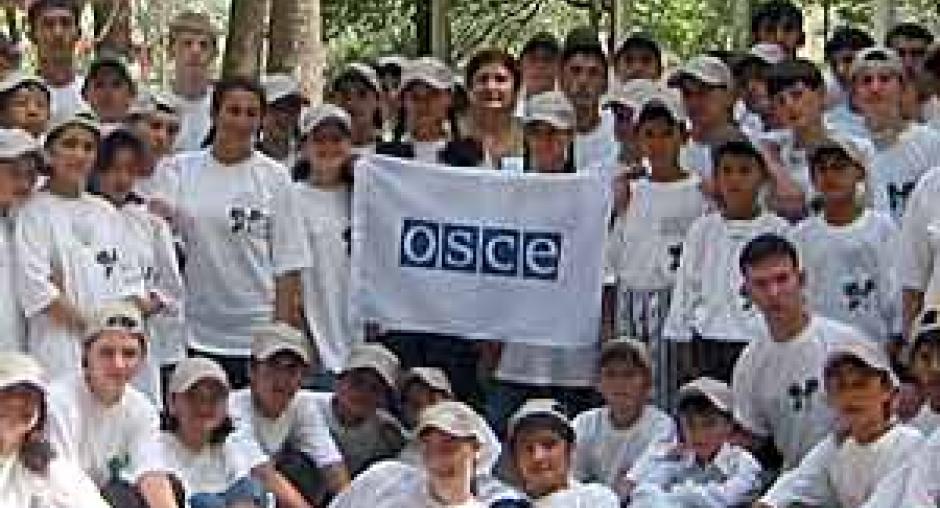Newsroom
OSCE Centre, WWF gather young people in Tajikistan to discuss ecological degradation
DUSHANBE 17 August 2004

(OSCE)125 of the most active young people from southern Tajikistan attend a 10-day camp to discuss environmetal problems, 16 August 2004. (OSCE) Photo details
DUSHANBE, 17 August 2004 - 125 young people from the remote southern areas of Tajikistan came together at a summer camp focusing on environmental issues.
The 10-day "Ecological Education for Youth" project, funded by the OSCE Centre in Dushanbe and the World Wildlife Fund (WWF) and supported by the Central Asian Regional Environment Center (CAREC) and Biodiversity National Focal Point, was launched today in Sharora camp in Varzob gorge, north of the capital Dushanbe.
The young participants, who come from near the Tigrovaya Balka reserve in southern Tajikistan, will identify the reasons for the reserve's deterioration and the ways to protect it.
"The future is in your hands," Saulius Smalys, Environmental Officer of the OSCE Centre in Dushanbe, told the trainees.
"Do not keep the knowledge you receive in the camp for yourselves. Share it with friends, neighbours and relatives, this way you will contribute to reserve protection."
Tojinisso Nasirova, Deputy Chairwoman of the State Committee for Environmental Protection and Forestry, said Tigrovaya Balka was a unique nature reserve in Tajikistan that has been deteriorating over the last five years.
"The unstable economic situation in the area surrounding the reserve is the main reason for irrational use of the natural resources by the local population that is reflected in the mass extermination of wild animals in the reserve, the illegal cutting down of trees and fish poaching," she said.
Young people will be widely involved in the decision-making process, and will produce a document on the principal causes of the deterioration of the reserve and the main concerns of the local population. This document will later be submitted to the Government of the Republic of Tajikistan.
The 10-day "Ecological Education for Youth" project, funded by the OSCE Centre in Dushanbe and the World Wildlife Fund (WWF) and supported by the Central Asian Regional Environment Center (CAREC) and Biodiversity National Focal Point, was launched today in Sharora camp in Varzob gorge, north of the capital Dushanbe.
The young participants, who come from near the Tigrovaya Balka reserve in southern Tajikistan, will identify the reasons for the reserve's deterioration and the ways to protect it.
"The future is in your hands," Saulius Smalys, Environmental Officer of the OSCE Centre in Dushanbe, told the trainees.
"Do not keep the knowledge you receive in the camp for yourselves. Share it with friends, neighbours and relatives, this way you will contribute to reserve protection."
Tojinisso Nasirova, Deputy Chairwoman of the State Committee for Environmental Protection and Forestry, said Tigrovaya Balka was a unique nature reserve in Tajikistan that has been deteriorating over the last five years.
"The unstable economic situation in the area surrounding the reserve is the main reason for irrational use of the natural resources by the local population that is reflected in the mass extermination of wild animals in the reserve, the illegal cutting down of trees and fish poaching," she said.
Young people will be widely involved in the decision-making process, and will produce a document on the principal causes of the deterioration of the reserve and the main concerns of the local population. This document will later be submitted to the Government of the Republic of Tajikistan.
